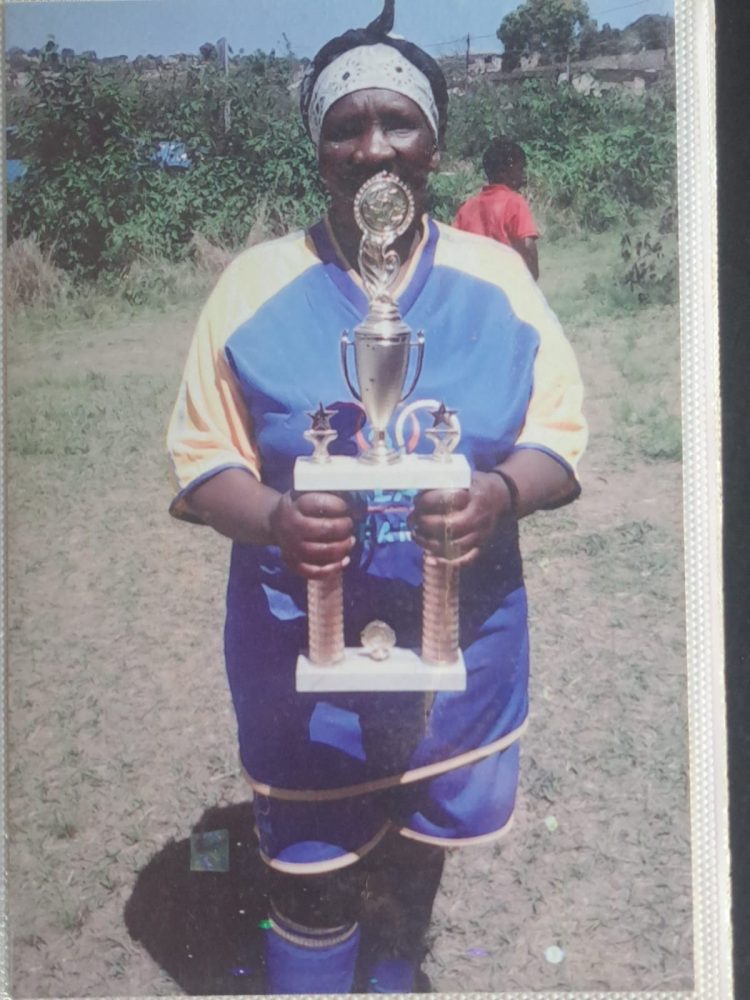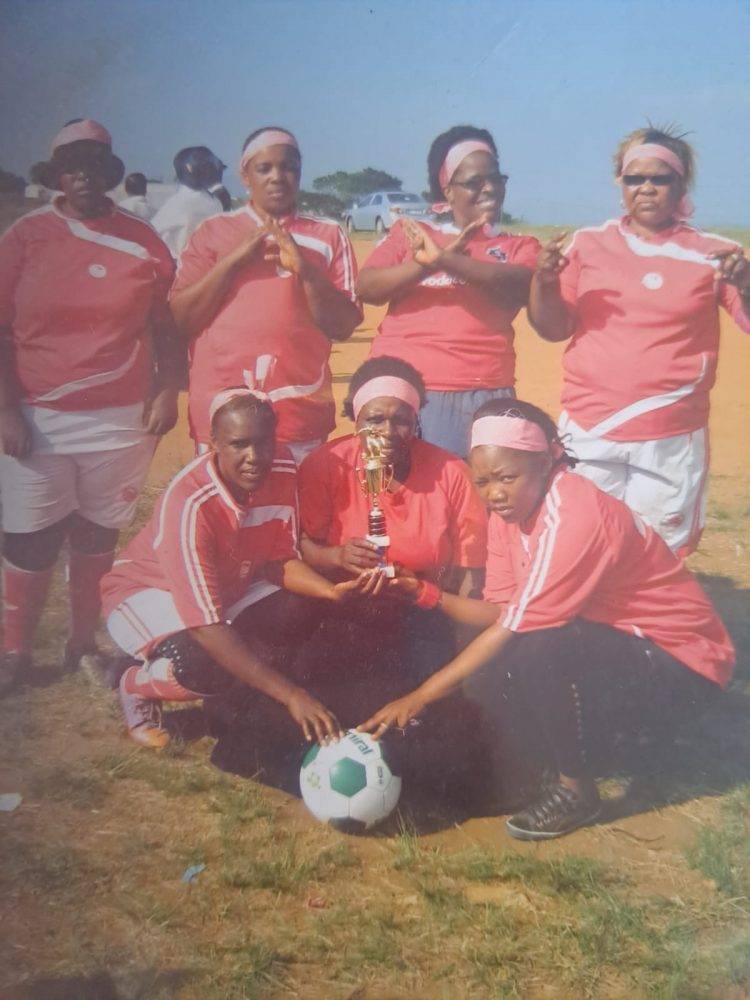Go gogo go: Dumeleni Kunene and Hillcrest Aids Centre Trust field worker Nomuhle Miya are ready for the Gogo Olympics.
Inchanga village entrepreneur and “Gogo Olympics” star Dumeleni Kunene’s husband deserted her for another woman about 20 years ago, leaving her with two children to provide for and with no income other than odd jobs as a domestic worker.
She could have fallen apart under the stress of becoming the sole breadwinner overnight. She lives in rural KwaZulu-Natal, which has the highest HIV prevalence in South Africa, and where older women struggle to provide for their children and orphaned grandchildren.
But Kunene, now 66, persevered, and will this month join hundreds of gogos and scores of young people who will participate in the 10th Hillcrest Aids Centre Trust Gogo Olympics. Usually an annual celebration, the event has not been held since 2019 because of the Covid-19 pandemic.
Kunene was introduced to the Hillcrest trust by psychiatric nurse Cwengekile Nikiwe Myeni, now 80, who was forming a network of 2 000 grannies in the Valley of a Thousand Hills near the upmarket suburb of Hillcrest.
Myeni started the Hillcrest trust’s Gogo Support Group programme in 2016 as part of its response to the devastation caused by HIV/Aids. The programme facilitates psycho-social support, family strengthening, improved skills development, food security and income generation, as well as physical exercise for gogos heading vulnerable households.
The Hillcrest trust, which was established in 1990, was one of the first NGOs in South Africa to respond to HIV/Aids crisis.
Its primary focus is on people living in the semi-rural Valley of a Thousand Hills, one of the epicentres of the disease where HIV infection rates are up to 40%, more than double the national average of 19%, according to the South African National Aids Council.
While Kunene also faced the trauma of losing two children to miscarriages by the time her husband walked out, other women in the area grappled with their own problems.
Some of their husbands had brought HIV/Aids infections into the marriage bed and others were losing children to the disease, leaving them to care for their grandchildren on paltry government pensions.
Younger and older women who tested positive for HIV/Aids kept this secret close to their heart, fearing the wrath of their husbands and rejection by family and friends.
“A nurse at the clinic was talking about a support group for women and I decided to join,” Kunene recalled.
That nurse was Myeni, who went on to be the National Woman of the Year finalist 2012, made the BBC’s 100 Women 2017 list and was chairperson of the Grandmothers Movement in South Africa.
“I wanted to be a part of the Gogo Support Group because it is a safe space where I could share my troubles and it was easy to talk,” Kunene said.
“Due to stigma, most gogos were not free to open up about their status and the status of their children. I have heard some of the grandmothers saying they are taking antiretrovirals and I give them hope and encourage them to take their medication and everything will be alright.
“But they are not free to talk about it. Their husbands sleep with other women and bring it home — it is still happening in our communities.”
 Kunene shows off the trophy she and her soccer team clinched at an earlier Gogo Olympics.
Kunene shows off the trophy she and her soccer team clinched at an earlier Gogo Olympics.

Nomuhle Miya, a Hillcrest trust field worker who regularly visits the gogos for psycho-social support and training workshops, said stigma remained a major problem.
“The thing is once you disclose your status, people will look at you differently and once they see you with their children and husband they think you might infect them. I don’t think they understand how infection works,” she said.
“There are men in the community who won’t go for testing, and when the women go, they think ‘I will know my status from my partner’. When the woman comes home and says she is positive, he assumes he is positive.
“Women also go and test and do not disclose their status because their husband will blame them for bringing the disease home, meanwhile the men are the ones sleeping around,” she said.
But, said Miya, women have become wise to dealing with HIV/Aids.
“It’s not like before. The women do take their medicine correctly, they go for check ups. The death rate has decreased because now you just have to check your status and keep it to yourself. They are wiser,” she said.
Her anecdotal evidence echoes the latest data released by Thembisa, the leading mathematical model of HIV in South Africa, which shows the rate of new infections and deaths is continuing to decline.
There were an estimated 164 000 new HIV infections in 2022 — having peaked at about 538 000 in 1999 — and 48 000 HIV-related deaths, less than a fifth of the peak of 265 000 in 2005.
The number of people living with HIV is therefore increasing because people on treatment are living longer.
Of the 7.8 million people living with HIV in 2022, an estimated 31% are women aged 25 to 49. The prevalence among female sex workers was estimated at 59%, and at 30% for men 18 or older who have sex with men. About 5.7 million people (73.2% of those living with the disease) are taking antiretrovirals and most people who are stable on treatment become non-infectious.
Kunene’s involvement with the Gogo Support Group deepened over the years. She joined a community garden and then developed her own garden, started sewing, farming poultry and planted moringa trees to produce tea — and she started playing soccer and participating in other forms of physical exercise to nurture her body and mind.
This Women’s Month, Kunene is one of more than 1 000 young and older women who will take part in the Gogo Olympics on 25 August at the KwaXimba Sports Ground in eThekwini West.
In collaboration with the department of sports and recreation and other organisations, young people have been trained to coach and support the grannies to get fit for the event which, according to the Hillcrest trust’s chief executive, Candace Davidson-Moolman, honours “the resiliency, strength and beauty of our gogos”.
“At a time when grandmothers are meant to be enjoying their golden years, many within our local communities are facing immense daily struggles as they support large families on their pension funds, deal with chronic illness and are raising vulnerable and orphaned grandchildren and great-grandchildren,” Davidson-Moolman said.
She said the Gogo Olympics had grown out of the Gogo Support Group programme, which promotes economic development, mental health and physical exercise.
Since Kunene joined 15 years ago, it has improved her health and financial wellbeing.
“It was out of this holistic health approach, knowing that thousands of gogos across South Africa are stepping into the role of caregivers and want to be as healthy as possible for the sake of their families, that the Gogo Olympics was born,” Davidson-Moolman said.
“However, we cannot make this milestone event a grand success without the support and involvement of our caring community and corporate partners. We appeal to all kind-hearted souls to join us in creating an unforgettable day of celebration, honouring the remarkable women who serve as game-changers and pillars of strength within our neighbourhoods.”
Kunene, who has participated in the games since the first event, is bubbling over with excitement at the prospect of playing soccer for her team. She usually plays striker but has been placed in a wingback position this year.
“I am much healthier than I was before the support group, it’s keeping me busy and my mind is at ease,” she said.
“I am making progress with my garden and the business is going well. I’ve travelled to Port Shepstone and Richards Bay to play soccer for the eThekwini municipality. My children are now grown up. My daughter works as a fashion designer; she has also taught a class of women how to sew, and my son lives in Johannesburg where he works as an electrician.”
Kunene is now a support leader for a group of 30 women who gather regularly in her home to pray and encourage one another to keep mentally strong and who meet to work in a communal garden and exercise.